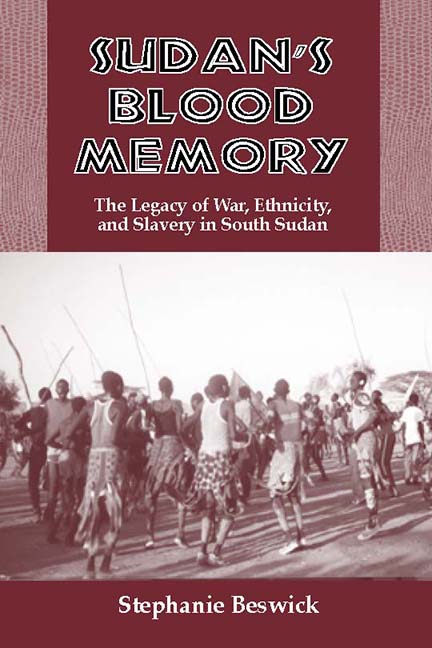Book contents
- Frontmatter
- Dedication
- Contents
- Maps
- Preface
- Acknowledgments
- A Note on Orthography and Languages
- A Note on Sources
- Map
- 1 Introduction
- 2 Geography and Brief History of Sudan
- 3 The Changing Nilotic Frontier
- The Ethno-Historical Formation of Southern Sudan
- The Ascendancy of the Dinka in Southern Sudan
- Foreign Intrusion and Its Consequences
- 15 Eighteenth-Century Slavers and Traders
- 16 Nilotic Chaos: Dinka, Nuer, Atwot, and Anyuak
- 17 Politics and Stratification among Stateless Peoples
- 18 Summary and History
- 19 Legacy of the Precolonial Era
- Notes
- Glossary
- Bibliography
- Index
17 - Politics and Stratification among Stateless Peoples
from Foreign Intrusion and Its Consequences
Published online by Cambridge University Press: 23 July 2019
- Frontmatter
- Dedication
- Contents
- Maps
- Preface
- Acknowledgments
- A Note on Orthography and Languages
- A Note on Sources
- Map
- 1 Introduction
- 2 Geography and Brief History of Sudan
- 3 The Changing Nilotic Frontier
- The Ethno-Historical Formation of Southern Sudan
- The Ascendancy of the Dinka in Southern Sudan
- Foreign Intrusion and Its Consequences
- 15 Eighteenth-Century Slavers and Traders
- 16 Nilotic Chaos: Dinka, Nuer, Atwot, and Anyuak
- 17 Politics and Stratification among Stateless Peoples
- 18 Summary and History
- 19 Legacy of the Precolonial Era
- Notes
- Glossary
- Bibliography
- Index
Summary
Although Dinka myths suggest certain key leaders attempted to centralize society, since the time these Nilotes arrived in Southern Sudan, they, and other pastoral stateless societies, have primarily pursued the typical pastoral lineage philosophy of decentralized politics. Lineage systems, generally, due mainly to lack of centralized and persistent political authority, tend to be in a condition of continual change and instability. For example, when a Dinka clan prospered and grew large, it tended to draw apart from the group of which it was a part, becoming distinct within itself. Thus, when the largest political entity, a cattlecamp (wut), increased in size due to the arrival of a group of latecomers, it often became overcrowded. Being less advantageously placed in the wet season camp, perhaps on water-logged land up to the very edges of the camping site, the late-comers often came to resent the superior geographical position of the first-comers. Thus, a prominent individual, usually a priest, gathered a group of his own kin, and perhaps others whose places in the wut did not satisfy them, and set off to form his own camp. This political strategy was successful as long as there was sufficient land available to which one might further migrate.
Dinka political fissioning also sometimes took place for other reasons. British administrator G. W. Titherington noted that the Dinka nature is essentially free and independent, that they think nothing of transferring from one clan or family to another following a fight or grievance. Often new family groups (gol) are fissiparous as a result of fratricidal blood feuds. Many also follow the departing priest because Dinka males prefer to withdraw from the larger corporate society of their kinfolk to relieve themselves of the customary requirement of contributing towards marriage payments.
Ultimately, in many pastoral stateless societies, including the Dinka, there developed a considerable scattering of lineages across large geographical areas as long as there was sufficient available land to which to migrate. Today, segments of the same Dinka clans, for example, can be found hundreds of miles from each other throughout Southern Sudan. Increasing populations, land shortages, ecological stress, and the Dinka philosophy of political atomization therefore encouraged political fissioning and geographical expansion for centuries, giving Dinka politics an embedded centrifugal quality. When arable land suddenly became scarce, however, fission was forced to a halt, as was the case on the northern Dinka frontier.
- Type
- Chapter
- Information
- Sudan's Blood Memory , pp. 175 - 184Publisher: Boydell & BrewerPrint publication year: 2004



